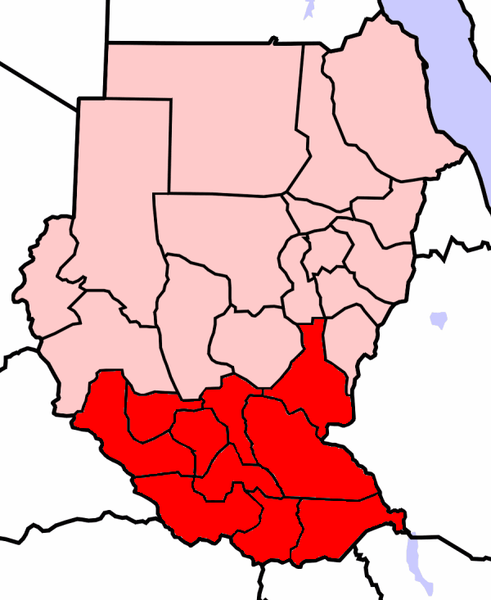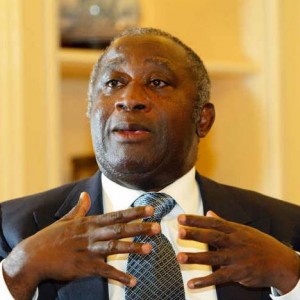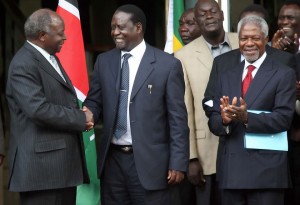
This new year once again starts out with a spotlight on Africa with the referendum in South Sudan set to be held over the weekend. By next week, we will see a new country emerge and Africa will welcome its 55th country… if all goes according to plan. My hope is that everything goes peacefully this weekend regarding the referendum that will decide whether South Sudan will become an independent country or not. The South will vote ‘yes’ for independence, what happens next is another matter.
The other spotlight worthy issue is the debacle in Cote d’Ivoire. As you are well aware, Cote d’Ivoire held elections (a run-off to be exact) in November after months and months of postponement and controversy over voter registration. President Laurent Gbagbo has been the leader of conflict-ridden Cote d’Ivoire since 2000, and has been a polarizing figure in a country that has been divided for many years, he has popular support from the south. The election in November pitted him against Alassane Ouattarra who is very popular in the north. Mr. Ouattarra won the election in November and for the first time in a long time the results were decided by the domestic electoral commission. This wasn’t one of those situations where an outside power recognizes the winner of a certain election, which is now what Mr. Gbagbo is claiming (foreign interventions). The people of Cote d’Ivoire decided, I believe by 8%, that Mr. Ouattarra is the better candidate to move the country forward and the rest of the continent and international community followed suit…

Mr. Gbagbo had other plans, claimed the results were void as soon as he found out that he was defeated and swore himself in as President in spite of the results (seems to be another common thing).*
So here we are, two presidents claiming they have won, one claiming the election was fair while the other claiming foul, and depending on who you ask, fortunately or unfortunately, the rest of the world has picked a side. Sound familiar? We have been down this line before and it does not end well.
Contested elections have resulted in a lot of bloodshed and the candidate with the most man power usually calls the last shot, even if he lost the election. The other option, coalition government (or power-sharing) is the new choice and deterrent against violence. We saw this in Kenya and Zimbabwe and now hear whispers in Cote d’Ivoire. I think it will be a bad idea if power sharing is mentioned or imposed on these two individuals and on Cote d’Ivoire.

Thankfully, all sides, including the African Union… ironically represented by Prime Minister Raila Odinga of Kenya, have stated that a power sharing agreement is not an option. We say this now but when the body count starts to rise, Mr. Ouattarra may feel compelled to agree to a political agreement. Mr. Gbabgo just has to hold on.
When President Mwai Kibaki and Prime Minister Odinga came together to form a coalition government, many people believed that this would serve as a blueprint for future elections that were contested.
The problem here is that many legitimate elections in Africa are close and many of them are contested. Does this mean we have to have a power sharing agreement all the time?
This is the wrong message especially for countries that are trying to shed themselves away from dictators and authoritarian regimes that refuse to relinquish power. Mr. Gbagbo sense that all he has to do is hold on just a little bit longer and he will get what he wants, perhaps increase instances of violence here and there knowing full well an intervention into Cote d’Ivoire by ECOWAS or the AU will not come to fruition. This sends the wrong blueprint to every other leader clinging to power facing elections, they think ‘Hey, all I have to do is just refuse the election results, swear myself in, and hold on till everyone agrees that a power sharing agreement is all I need!’
Power sharing agreements set a potentially dangerous precedent for the electoral and democratic process in Africa. Maybe it is the best option for many countries that have to choose either violence or power sharing as an option. Kenya worked for a list of reasons, the death toll was rising significantly, it was on the brink of civil war, it affected the entire east African region so everyone had a vested interest to stop the violence and the winner of the election (though we know it was Prime Minister Odinga) was not declared by the 100% certainty and independence that we see in Cote d’Ivoire. In Zimbabwe, it has hardly been coalition or a government.
In the recent elections in Tanzania, the political parties in Zanzibar agreed prior to the elections, in a way to preempt any violence, that some sort of power sharing agreement will be the makeup of the government no matter who wins the elections. Time will tell if this works, so far we have more protests and violence on the mainland than Zanzibar. We also know that President Kibaki and Prime Minister Odinga needed each other and still do; the same cannot be said for Mr. Gbagbo and Mr. Ouattarra.
Precedence means a lot to Africa. If a power sharing agreement is allowed and the African community backs down on Gbagbo then we are in for a very long year. The last time I checked, we have at least 10 elections this year and that is 10 potentially close, contested and possibly violent elections too many. Do we want to have power sharing agreements for all of them in case things get a bit messy?
*Disclaimer: I apologize for not delving into the causes and consequences of the civil war in Cote d’Ivoire and also why the country is divided between north and south.


Ahmed, it is true we are witnessing power sharing sharing across the world. It recently happened in the United Kingdom and I think in Australia as well. No doubt that power sharing is very challenging especially in African context. Very few power sharing agreements have worked out the way they were intended. One of the problem could be that they do not address the very cause of the conflict they intended to.
Unlike in the developed world, most African power sharing agreements exist where one part has alleged that an election was not free and fair. In effect, this makes African power sharing agreements to be seen as a means to normalise volatile situations caused by a rigged election.
I believe that power sharing agreements would not flourish in Africa if we have actual free and fair elections. The reason that we end up with these power sharing agreements in Africa is the usual suspect that “someone has stolen an election.” Power sharing should be a result of the people who voted; not the politicians who want to be and/or remain in power.
nice piece…
First, I think Southern Sudan should just be its own country, instead of being pushed around by the thugs in the north.
Secondly, I like the question that you asked, about power sharing as a solution to all disputed elections. I think power sharing is a dangerous path and doesnt set a good example. What power sharing does (in my personal opinion) is create shortcuts. The same way, a person with chronic headaches survives on hedex. Hedex doesnt cure the problem, only prolongs it.
Thirdly, with the issue of Kenya, I am sad to say I am glad Odinga’s votes were stolen and he didnt become the president of Kenya. I know that is so undemocratic thing to say, but sometimes democracy doesnt not serve the best interests of the people.
I have followed Odinga since he was appointed the Prime Minister, and I am disappointed. He didnt speak against the proposed pay raise for the Waheshimiwa. His comments during the Zimbabwe situation were nothing but surprising, taking to consideration he went through the same thing.
But what has also caught my attention in these recent days, is his comments against homosexuals in Kenya. While gays continue to be harassed (thanks to the American Evangelicals, just dont get me started on this group of people), Odinga had the nerves and suggest outrageous things against this group of people. If you asked me, it was as if he was inciting “violence” against them, and this is the man who should know all too well what violence looks like, 2007 does that ring a bell.
After following Odinga, he doent fit to be the president, and I cant help myself but ask myself, what would have happened if he was the president. However, where do we draw the line, and who calls the shots, of who fits and who doesnt fit to become the president, even if so & so won the election democratically.
As far as Ivory Coast is concerned, the African nations are playing russian roulette or should I say, they are walking on a land mine field. I am saying this, because most of these people have so much dirt on them, and what they decide to do to Gbagbo, may haunt them later. As they say what goes around comes around, and since almost all of them have a little bit of Gbagbo in them, it should be interesting.
Power sharing is becoming excuse for inefficiency (read: corruption). Make it a legitimate way to lead, and you undermine leadership in Africa, Cote D’Ivoire in this case. Challenge it and election transparency, and creative leaders will emerge.
Ahmed, why don’t you post more often? Once a week?… 🙂
Just curious: Most of the time two candidates — let’s say, running for presidency — have incredibly opposing or antagonistic policies. And they do know how to do the talking and sell (policies) to voters; as if it matters at the end of the day… So, what happens when it comes to forming a coalition government? Have not heard anything from Zanzibar re: coalition govt. policies.
As in, for instance, are CUF policies on education system reform going to be thrown out of the window?
Are coalition govts more or less ceremonial?
@ Proches, I agree with you and in reality if many of these leaders actually addressed the problems and grievances of the people and perhaps took a more centrist approach there would be more pronounced election results. However that is only IF the elections that are held are free and fair. I’d like to believe that the elections in Cote d’Ivoire were free and fair and of course you have to put an error margin in there but at least it wasn’t 99% of the vote going to one particular candidate like we see in other countries. So like you said, the answer isn’t power sharing agreements but free and fair elections. Unfortunately for many leaders, having free and fair elections means having a 100% certainty that they will lose.
@ Bahati I understand your concerns about Odinga and perhaps it may be a blessing in disguse that he had to share the power. I still believe that both leaders made a compromise because they needed each other, Kibaki wanted to save his legacy and Odinga wants to win in 2012…Thats another year that is concerning. The Cote d’Ivoire situation is interesting, all the leaders that have asked Gbagbo to step down probably would not do the same thing in his situation. Just like the Mugabe situation, no leader likes to point fingers at Mugabe because 1) they are scared of him 2) they are just as bad or even worse at governing.
@Steven, I know I am terrible at posting on a consistent basis. Perhaps that is a new goal for the new year. I just hope whatever I write is relevant! Coalition governments can be ceremonial and they can actually govern, its a fluid term. Can the current US Government be seen as a coalition government since one party holds one branch of government while the other party holds the other and at the end of the day they are expected to make reforms and actually govern? I think in our cases, there is always an alpha dog in the coalition government and whatever that individual wants is translated into action, so if that alpha dog wants CUF related education policies implemented…it will get done.
I’m glad you wrote about this Ahmed.
These recent events concerning power-sharing seem to suggest that the level of trust is political institutions is low, compared to the ideals of a “true” democracy.
But if there is no trust between those counting votes and those in leadership (we’re not even talking about trust between the masses, even if this is assumed to be very high) then how can we be sure even a power-sharing agreement would work? Rather, how can we trust a leadership that has come from untrust?
power sharing arrangements are being exploited by dictators to further their desire to cling onto power. take the zimbabwe example, mugabe has been in power for over 30 years. in the first round of 2008 elections, he was defeated by tsvangirai. come the second round, he knew defeat was imminent, he used all the machinery at his disposal to unleash violence onto innocent people in order to force his rival off the race. this was well calculated move. my worry is, dictators like mugabe use state machinery {uniformed forces} to further interests of his own party and thwart the wishes and aspirations of the electorate. i appeal for sadc to ensure in the coming election, uniformed forces are not used by mugabe’s party to subvert people’s interests. infact the top chefs if the uniformed forces should leave their position ifever zimbabwe is to have free, fair and credible elections. because of their partisan nature, these guys should just leave office. dictators mustn’t have room in africa.